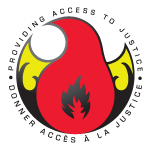
Aboriginal Justice Strategy
What is Legal Aid Ontario’s Aboriginal Justice Strategy?
The Aboriginal Justice Strategy (AJS) is an initiative by Legal Aid Ontario to expand access to justice and increase LAO’s ability to respond to local needs of First Nation, Métis, and Inuit clients and communities.
Since the AJS’ inception over eight years ago, LAO has been able to build relationships and increase access to its services. As the AJS has continued, its goals have increased and expanded.
The first five years of the AJS: 2008-2013
Due to the disproportionate number of First Nation, Metis clients in the Ontario justice system, LAO recognized the need to develop and implement the AJS. In 2008, LAO issued a mandate to combat this issue with a three-to-five year plan which would achieve measurable improvements to LAO’s services to Aboriginal people. The strategy was developed after consultation and based on those consultations LAO released “The Development of Legal Aid Ontario’s Aboriginal Strategy” paper.
The Next Five Years of the AJS: 2013-2018
An assessment of LAO’s work has highlighted that the situation for Aboriginal peoples in Ontario’s justice system continues to be serious. Persistent poverty, the increase in Aboriginal representation in the criminal and child protection systems as well as the growth in the population of Aboriginal youth, all point to the need for the AJS to continue its work.
LAO is committed to increasing the services it provides to First Nation, Métis and Inuit clients and communities. To that end, LAO has developed four strategic priorities that will guide the next five years:
- Improve and increase access to Gladue services for Aboriginal peoples and communities
- Develop a localized model for delivering legal aid services that is responsive to the needs of Aboriginal individuals and communities
- Improve relationships and increase LAO’s understanding of the legal needs and unique circumstances of Aboriginal populations in Ontario and how to address them
- Strengthen LAO’s internal capacity to enhance services to Aboriginal clients and communities, and ensure sustainability of improvements
Based on these priorities, significant milestones have been achieved over the last eight years including:
- Creating an Aboriginal Advisory Committee to LAO’s Board of Directors
- Ensuring Aboriginal representation on LAO’s Board of Directors
- Developing and implementing an Aboriginal Self Identification Question that will enable LAO to gain a better understanding of client needs and to allow for proper referrals to culturally appropriate services
- Providing LAO management and staff with Aboriginal cultural competency training
- Implementing a recruitment policy aimed at hiring more Aboriginal staff
- Developing panel standards for representation of Aboriginal clients in criminal matters through the Gladue panel
- Providing five extra hours on criminal certificates to allow counsel to prepare and deliver Gladue submissions at bail and sentencing
- Providing on-going duty counsel services in Gladue court locations in Ontario
- Forming partnerships with Aboriginal defence counsel to provide community based legal advice services in First Nation communities and Aboriginal organizations
- Providing funding for Gladue report writers in 16 locations across Ontario
- Providing ongoing funding for:
- Nishnawbe-Aski Legal Services Corporation
- Grand Council Treaty #3
- The Ontario Federation of Indigenous Friendship Centres
- Aboriginal Legal Services
- Community Legal Assistance Sarnia’ s Baamsedaa program
- Hamilton Community Legal Clinic’s YenDene program
Moving forward, LAO has committed to implementing the Truth and Reconciliation Commission’s Calls to Actions relating to the justice system. As a result, LAO formed a Working Group comprised of staff across the province to work at the local level to increase access to LAO services and to build relationships based on mutual respect and reconciliation.
For more information please contact:
Aboriginal Justice Strategy
Legal Aid Ontario, Provincial Office
Atrium on Bay, 40 Dundas St. W, Suite 200
Toronto, ON – M5G 2H1
Email: aboriginalstrategy@lao.on.ca
 Aboriginal Justice Strategy
Aboriginal Justice Strategy